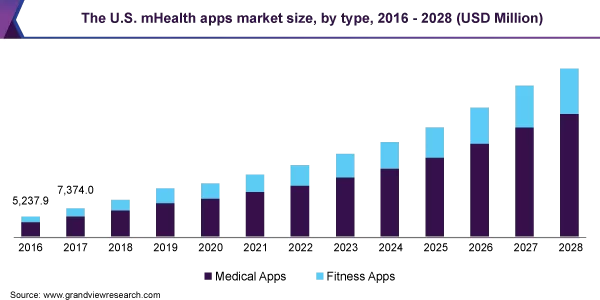“I want a perfect body, I want a perfect soul” is not just a Radiohead quote. In 2021, it’s also a very real goal for many citizens of developed countries. Millennials, Gen Zs, and even Boomers are doing more than ever to keep their bodies and minds healthy.
There are plenty of reasons for this boom. Firstly, we know more than ever about health: most people are perfectly aware that eating healthy is important, smoking kills, and mental health problems should be addressed, not ignored. It may seem perfectly obvious and unworthy of a mention to you, the reader, but this is exactly the point. Fifty years ago no one would think of avoiding Coca-Cola for its sugary nature, and eighty years ago the drink still used cocaine in its recipe. Look how far we’ve come.
Of course, it’s not just the knowledge that nudges us to stay healthy. It’s also the never-ending work of governments, public services, health professionals, and marketers. Human labor is expensive, and so is healthcare. Everyone is interested in keeping people active and alive for longer. Luckily, we don’t mind.
The third reason for the growing interest in personal health is the emergence of health apps. Of course, you may argue the opposite: interest in a healthy lifestyle caused the development of health apps. And this is obviously true. However, so is the previous point. Healthy lifestyle and health apps enforce each other like no chicken and egg ever could. Health apps make good habits fun and easy. They gamify health. They quantify it. Getting those seven thousand steps becomes a goal that is just fun to achieve; seeing this line hit the target causes a tiny, but very real dopamine boost. It’s weirdly exciting to discover how many hours you actually slept, and isn’t it pleasant when your Apple Watch or fitness tracker is in awe of your exercise routine?
Do mHealth apps really work?
Health apps actually work. Studies showed that the mHealth apps encourage participants to exercise more, eat healthier food with lower calories, walk more steps, and sleep longer on a daily basis. Users of mHealth apps become more engaged and autonomous when it comes to their health. They are more motivated to improve their lifestyle and more consistent in keeping it up compared to the non-users. A survey conducted by Health IT Outcomes in 2019 showed that 93% of physicians believe that such applications can help improve patient health.
mHealth apps: market growth and types
The promise that surrounds the mHealth market is high, and this has its consequences. According to a new report by Grand View Research, the global mHealth apps market is expected to reach USD 149.3 billion by 2028 and is expected to register a CAGR of 17.7% over the forecast period.
This covers both types of mHealth apps: fitness apps (also called “healthy lifestyle” apps or “wellness” apps) and medical apps. According to the classification, Grand View Research uses, fitness apps include: diet, nutrition, exercise (see the case study for the workout plan generator created by Elinext), fitness, lifestyle, and stress. This is the type of apps this article will focus on. The type of apps this article will not focus on is medical, and this includes women’s health, Personal Health Record, medication management, diagnostic, remote monitoring, disease management, and others. This is how the two types compare by market size:
mHealth apps for a healthy lifestyle to try in 2021
As mentioned before, healthy lifestyle apps include apps that focus on a healthy diet, nutrition, exercise, fitness, lifestyle, and mental health. We’ll cover apps that promote one or more of these categories in a way that is creative, evidence-based, effective, and doesn’t have any prove side-effects.
Noom is a popular and much-praised diet and nutrition app, whose main method is to change the user’s behavior. The app offers an “easy-to-follow behavior-management program with a bonus weight-loss component”, as reviewed by one of the users. The app tracks weight and food intakes, counts calories, and connects you to the community of people who also want to eat healthier. Ultimately, it nudges the user to create good healthy habits using the good old gamification, education, and psychological approaches, but in a way that’s transparent (they explain why these approaches work) and not condescending (at least, they are trying their best not to be).
Fabulous is a routine-building app. It gives you a choice of healthy routines and allows you to select any of the goals you want to focus on: feel more energized, lose weight, sleep better, or focus and concentrate. It starts you off with something easy, such as having a glass of water every day after you wake up. Every morning, it sends you notifications, reminding you to drink some water at the time you specify. After three days of doing this first task, the app unlocks the possibility of adding the next habit you want to acquire. There are also activities the app offers you to try, such as exercise, yoga, and meditation. You can choose activities to practice at the moment by telling the app how much time you have for it. All in all, Fabulous is a great app for improving your daily life, step-by-step. Developed with the help of researchers, it has the potential to help you with the most common goals, from losing weight to feeling less stressed.
Strava is a fitness app and a workout routine maker that is designed for those motivated by competition, community, and peer pressure. It’s also often described as a social network for people who want to be active. The developers behind Strava know that human beings are social animals, and they often require other people when they choose to run, swim, or bike. Strava lets the user join group workout challenges, follow your friends’ activities, and share photos of oneself on a morning run. Besides, it’s great at tracking and analyzing workouts and training assistance. If getting physically fit is your goal, dream, and New Year’s resolution, Strava is a good health app choice.
People generally underestimate the importance of sleep for their health. They go to sleep late and wake up early to have time for other health-related activities, such as exercises, morning runs, and meditation practices. Even more often, they stare at the computer more to get more done, and just don’t see not getting eight hours of sleep every night as a major problem. Yet, it is one. Plenty of studies showed that sleep is crucial for our health. It affects almost everything in your body there is to effect, and the lack of it literally kills people. Sleeping more increases overall health gives you a better chance to stay at a healthy weight, lowers the risk of serious health problems, such as diabetes and heart diseases, reduces stress, improves mood, improves cognitive abilities, and does so much more. However, sleeping more requires as much discipline as any other health-related task, and one might require help falling asleep if he or she suffers from insomnia, which is not at all rare. In addition to that, it’s not just the length of sleep that matters ― it’s also the quality and the alignment with the person’s circadian rhythm. Sleep Cycle is an app that helps with all of this: its content is aimed at teaching you how to sleep more and better, and how to fall asleep easier; its alarm clock wakes you up according to your circadian rhythms, and other features analyze and track your sleep to reveal the real sleep situation you’re in and to encourage you to sleep more.
MindDoc helps the users take care of their mental health. It might be more suitable for those already struggling with anxiety or depression, however, it could also be useful for healthy individuals. The app acts as a mood journal: it regularly asks you questions, answering which helps you track your emotional state and observe how your emotional state changes in relation to other areas in your life. The app analyzes your answers, produces reports about your wellbeing and mental health, and gives you insights into your mood patterns and correlations. It also offers appropriate, evidence-based, and in-depth content regarding mental health issues. While perfectly simple, the app can bring changes by allowing the user to see what their mental state is really like and how it can be improved.
What’s wrong with mHealth apps?
The exponential growth of mHealth apps has its dark side. Firstly, the very fact that there are so many apps that we are supposed to be using because they are good for us makes us anxious. It makes us wonder what we are missing out on: weight loss? better looks? health? There is always something new to try: a different method, a different approach, a better algorithm; meditation, workout routine maker, face yoga… The dilemma is real, and the best solution is to prioritize your health goals and download accordingly (or to have little memory on your device). Secondly, data privacy and security is still a huge issue for most mHealth apps. A recent BMJ study reported that almost 90% of health apps are built with the ability to collect and share user data. Most of this data then goes to third-party services, such as ads or analytics. This study also discovered that less than half of the apps shared user data according to their privacy policy, and 28% of the apps included in the study didn’t provide a privacy policy at all. This is extremely distressing.
Final words
Health apps can change our lives for the better. If chosen wisely, they can help us form good healthy habits and get rid of the bad ones, all while having fun. Yet, it’s important to stay sensible and remember that first, you don’t need every app on the market, and second, it’s good to check the app’s stand on data privacy.
Related Fallstudien:










